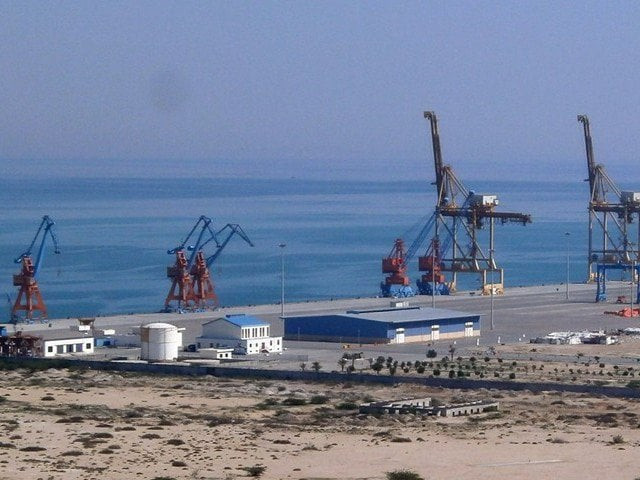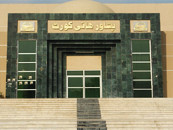Baloch ire prompts security fears for China-Pakistan Economic Corridor
Army announces special security division to protect Chinese workers in Pakistan

PHOTO: AFP
Director General Inter Services Public Relations Asim Bajwa in a tweet announced that a special security division comprising army battalions were going to be deployed for the security of the projects.
Pak-China Eco Projs: Spec security div comprising Army battalions,CAF Wings being raised as dedicated force 4 Pak-China Eco projs
— Gen(R) Asim Saleem Bajwa (@AsimBajwaISPR) April 21, 2015
The special security division will be comprised of nine Army Battalions and six wings of civil armed forces, said Bajwa adding that the division will be commanded by a major general.
Spec Security Div for Pak-China Eco Projs will comprise of 9 Army Battalions,6 Wings Civil armed forces.Will be commanded by a Maj Gen
— Gen(R) Asim Saleem Bajwa (@AsimBajwaISPR) April 21, 2015
Pakistani and Chinese officials on Monday signed a series of more than 50 accords to inaugurate the China-Pakistan Economic Corridor, which will create a network of roads, railways and pipelines linking China's restive west to the Arabian Sea through Pakistan.
Read: Trade corridor tops Chinese investment bonanza
The project is part of Beijing's "Belt and Road" plan to expand its trade and transport footprint across Central and South Asia. It will give China easier access to Middle Eastern oil via the deepwater port of Gwadar in southwest Pakistan.
The Chinese aid also aims to boost Pakistan's long-underperforming economy, which the IMF projects will grow 4.3 percent this year, and tackle its long-running energy crisis.
Beijing and Islamabad have long enjoyed close ties and Xi's speech on Tuesday, the first by a Chinese president to a joint session of parliament, was full of the flowery rhetoric that typifies their official exchanges.
Read: Pakistan high on Chinese diplomatic agenda: Xi Jinping
"Today Pakistan has a historic development opportunity. Prime Minister Sharif has crafted the vision of the Asian tiger dream. It outlines a great blueprint for Pakistan," he told lawmakers.
But away from the handshakes and backslapping, there are real security concerns over much of the plan, which relies on developing Gwadar -- control of which was passed to a Chinese company in 2013.
The port lies near the mouth of the Gulf of Oman, east of the Strait of Hormuz through which much of the Middle East's crude production passes.
Read: China’s security as important as Pakistan’s, Nawaz tells Chinese president
But linking Gwadar to the rest of Pakistan and on to the western Chinese city of Kashgar, 3,000 kilometres away, would involve major infrastructure work in Balochistan.
This is one of Pakistan's most unstable provinces and has been dogged for over a decade by a bloody separatist insurgency.
Baloch insurgents, who oppose Gwadar's development while the province is not independent, have in the past blown up numerous gas pipelines and trains and attacked Chinese engineers.
Earlier this month the Balochistan Liberation Front claimed an attack in the province that left 20 construction workers from elsewhere in Pakistan dead, the bloodiest separatist incident since 2006.
Read: ‘Outsiders’ targeted: Orgy of bloodshed let loose in Turbat
Siddiq Baloch, editor of the Balochistan Express newspaper, said the rebels want to scare off investors and developers who are working with the Pakistani government -- such as the Chinese.
"There is the thinking that by doing this, they want to disrupt the working of the economy, disrupt the administration, challenge the administration in the area," he told AFP.
Suppressing the rebellion by force in Balochistan's desolate and sparsely-populated landscape, much of which is desert and mountains, has proven difficult.
Abdul Malik Baloch, the Balochistan chief minister, said strenuous efforts were under way to try to negotiate with the rebels.
"I am trying to convince them, but still they are not convinced," he told AFP in the provincial capital Quetta.
"This is my honest opinion, this is the only way -- to start talking and bring the insurgents to the table."
In a bid to allay fears, President Mamnoon Hussain told him a special army division would be given responsibility for the safety of Chinese workers, a presidential source told AFP.
Baloch insurgents on Monday attacked an airport in Gwadar district, causing damage but no casualties, in a vivid reminder of the dangers.
Read: Security forces successfully repelled attack on Air Traffic Control Radar in Pasni
Andrew Small, author of The China-Pakistan Axis, said China's recent experience of working in Pakistan had given it a good idea of which projects could proceed in spite of security worries.
"China is certainly not completely confident that all the projects will be protected, but they think these security problems are one of the main reasons that it's so important that they move ahead, for the sake of Pakistan's stability," he told AFP.
Read: Two security personnel killed in Gwadar gun battle
Even if not all the projects envisaged in the corridor plan went ahead, Small said, "The scale is so large that it should still have a major economic impact regardless".
And while the Chinese projects dwarf an American assistance package to Pakistan of $5 billion that began in 2010, Small said Beijing was not interested in supplanting Washington in the region, preferring to see the US maintain its support.
Xi wrapped up his two-day visit on Tuesday before travelling on to Indonesia for an Asian-African summit.



















COMMENTS
Comments are moderated and generally will be posted if they are on-topic and not abusive.
For more information, please see our Comments FAQ